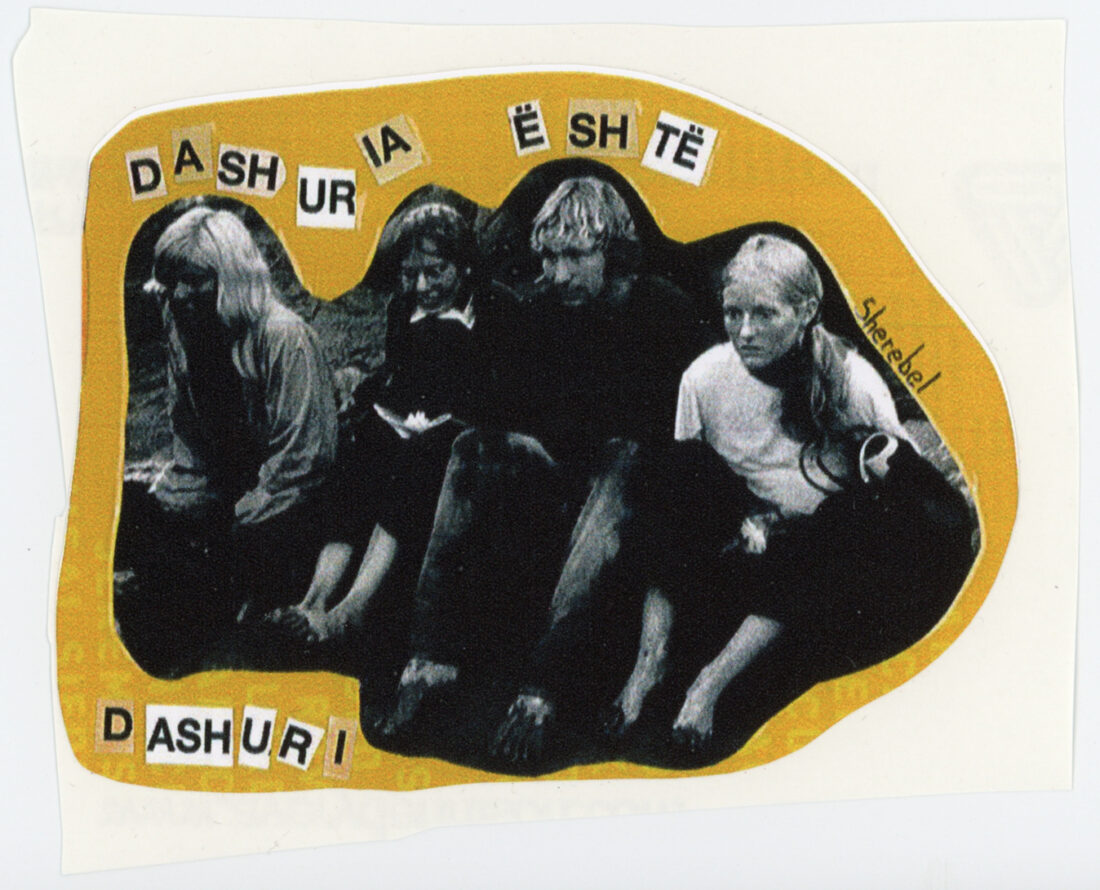Featured artist: Sherebel (Albania)
- Published
- in all, Featured artist, Stickerz
Ada Reso, one of the artists that I met recently from the Slavers of NY sticker project, was in Albania earlier this year and sent me some political stickers from an artist there who goes by the name “Sherebel.” I reached out to see if Sherebel and I could meet on Zoom so she could tell me more about her work. First, here is the bio she sent me.
Artist biography
Livia Tice, aka „Sherebel“ (art & street name), is a 22 year old genderfluid & queer identifying person from Tirana, Albania. She is a writer, a slam poet, a maker of collages, stickers, graffiti, zines, film photography, short experimental films, etc. A multidisciplinary artist integrating their work with social issues & activism. Sherebel is finishing her undergraduate studies in Psychology this year. She has been a martial art practitioner (Aikidoka) since 2018 and a self-defense instructor since 2020. Livia has also initiated the creation of a social & cultural center in Albania called “Uzina”, a former NGO & current youth-led collective focused on social improvement and cultural initiatives.
SK: Why do you make stickers? What it is about stickers as a medium of creative expression that attracts you?
The reason why I make stickers is because I think they are very cool. I have a minimalistic mindset and philosophy, but I am very attached to objects and things I can touch. Having a visual work transformed into a sticker, and putting it in your laptop, water-bottle, phone, notebooks, I think there’s something amazing about that. It is so practical and flexible. And in that way I think it’s such an appropriate medium for activism through art at the same time. You can put your opinions anywhere, it is not very complicated to do, and you don’t have to be an established artist or designer to create a sticker and express yourself. I find so much freedom in that!
Interview | Intervistë
SK: Okay, we should be recording now.
Sherebel: Yeah.
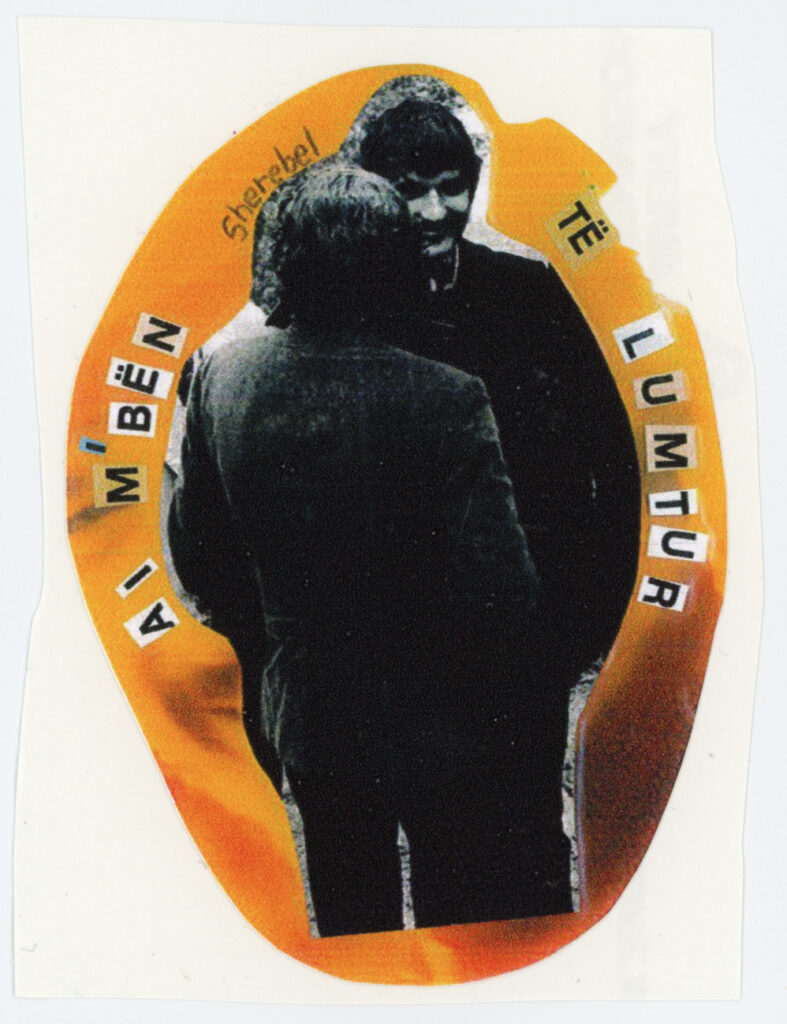
First sticker | Sticker-i i parë
SK: Can you give me a translation and tell me what’s going on in the image?
Sherebel: Yeah. So basically, the sticker you are holding says “Ai më bën të lumtur,” which means “He makes me happy.” There are two guys together having a conversation on a yellow background. It was part of some queer stickers that I did for pride month, for June. The idea is also a form of activism, because we don’t really have any known Albanian stickers for queer people or queer activism. It’s something you don’t see very often, and my vision was to do these sort of things and put them across the city for the people to see them
SK: Yeah, it’s nice. How did you get the edge like that?
Sherebel: Umm, well I had it printed at a studio. The edge itself, actually, wasn’t my intention at all. But the picture itself had some white spots, and they cutout the white spots thinking that it was special in that way. It was their doing from the printing studio.
SK: That makes sense. That is really cool. What does “Sherebel” mean?
Sherebel: “Sherebel” is my art name.
SK: Your street name?
Sherebel: Yeah. In Albanian it means “Sage.”
SK: “Sage,” like the plant? I thought “sage,” as in wise. It can be both!
Sherebel: Actually, yes.
SK: Atëherë, a mund të më përkthesh e të më thuash se çfarë po ndodh në këtë imazh?
Sherebel: Po. Atëherë në sticker-in që je duke treguar thotë “Ai më bën të lumtur”, që do të thotë në anglisht “He makes me happy” dhe këtu janë dy djem së bashku duke bërë një bisedë në një sfond të verdhë. Kjo bën pjesë në serinë e sticker-ave Queer të cilat i krijova dhe për muajin e krenarisë, për qershorin. Kjo ishte ideja kryesore që këto të jenë dhe si një formë aktivizmi pasi ne nuk kemi stickera të njohura shqiptate për aktivizmin Queer, ndaj është diçka që nuk e sheh shpesh. Vizioni im ishte të bëja gjëra të tilla dhe t’i ngjisja nëpër muret e qytetit që të gjithë njerëzit t’i shikojnë.
SK: Po, është e lezetshme. Si e bëre këtë prerjen?
Sherebel: E printova në një studio. Dhe fotoja vetë, në fakt… nuk ishte ky qëllimi im fare. Por fotoja vetë kishte disa pjesë të bardha dhe kur e prenë stickerin menduan se ato copëza nuk i përkisnin fotos. Është e veçantë në këtë mënyrë… kjo është bëma e studios së printimit.
SK: E kuptoj. Është e paparë. Dhe për çfarë qëndron “Sherebel”?
Sherebel: “Sherebel” është emri im i artit.
SK: Emri yt i rrugës?
Sherebel: Po. Në shqip do të thotë “sage”.
SK: Sherebel si bima? Mendova se “sage” si “e mençur”. Mund të jetë të dyja!
Sherebel: Në fakt, po.
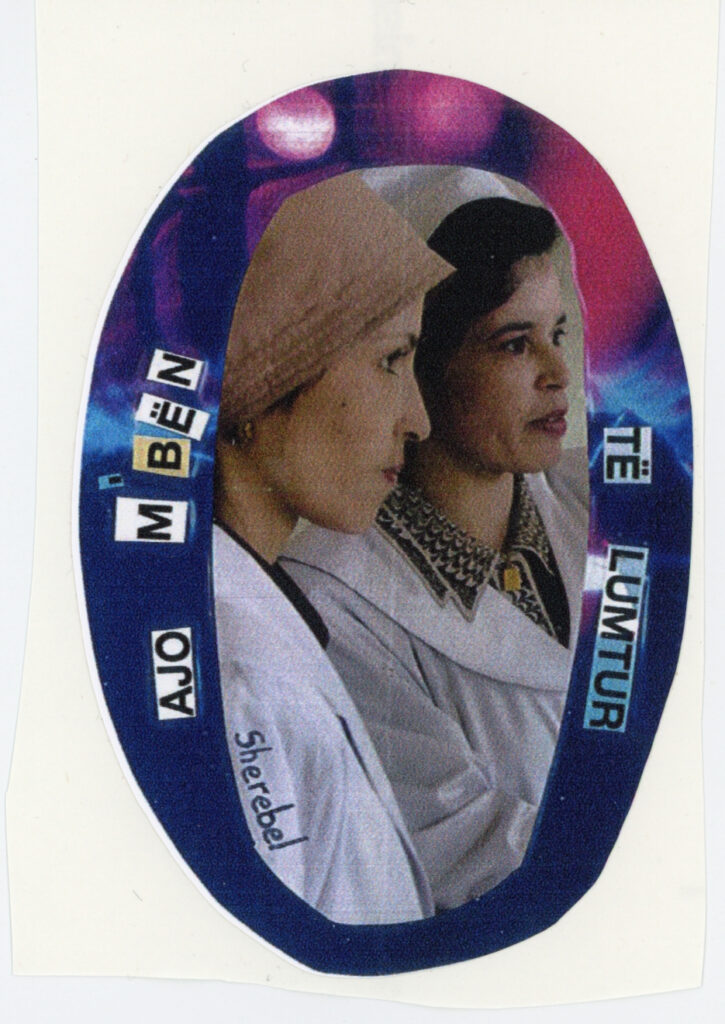
Second sticker | Sticker-i i dytë
Sherebel: This one is pretty similar to the other one, it says: “Ajo më bën të lumtur” or “She makes me happy.” There are two women in the picture. I got the photo from a magazine showing different developments in different countries regarding women’s rights and different aspects of women’s life, in research and different jobs at work. I think they were researchers or in the science field. I wanted to portray this as an aspect of what women can do.
Sherebel: Atëherë kjo është goxha e ngjashme me të parën dhe thotë “Ajo më bën të lumtur”, “She makes me happy” dhe këtu janë dy gra në foto. Foton e kam marrë nga një revistë e cila tregon zhvillimet në shtete të ndryshme për sa I përket të drejtave të grave dhe gratë në aspekte të ndryshme të jetës, në punë të ndryshme. Mendoj se ato janë hulumtuese ose në fushën shkencore. Doja të shfaqja se kjo është diçka të cilën gratë mund ta bëjnë.
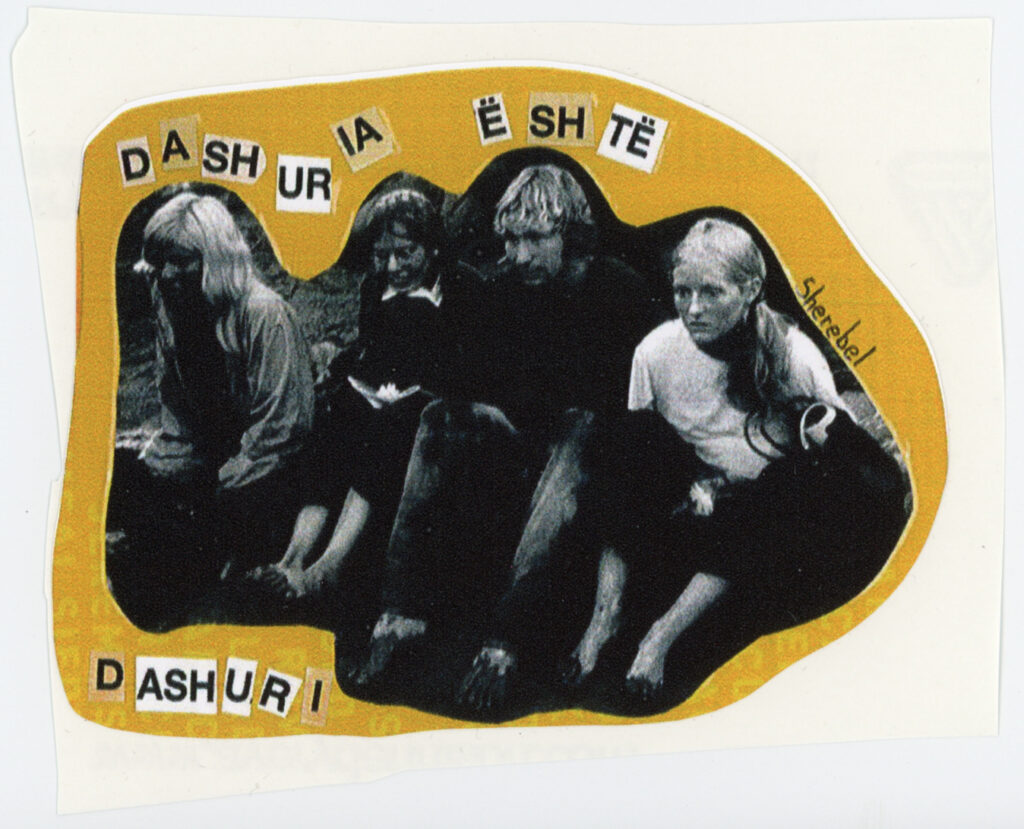
Sherebel: This one says “Dashuria është dashuri,” “Love is Love.” It’s a bunch of people not really expressing any sexual/romantic gestures but just hanging out and being themselves. That’s really the message I wanted to send. It is just people, and we are all people, and we are all the same, and love is just something that exists. We are part of it, and we experience it as we are.
Sherebel: Kjo thotë “Dashuria është dashuri”, “Love is Love” dhe këtu janë disa njerëz të cilët nuk po shprehin gjeste romantike apo seksuale por thjesht po qëndrojnë me njëri-tjetrin po janë vetvetja. Ky është në të vërtetë mesazhi që doja të jepja, që janë thjesht njerëz dhe ne jemi të gjithë njerëz. Dhe ne jemi të gjithë njësoj dhe dashuria është thjesht diçka që ekziston e ne jemi pjesë e saj dhe e përjetojmë atë ashtu siç ne vetë jemi.
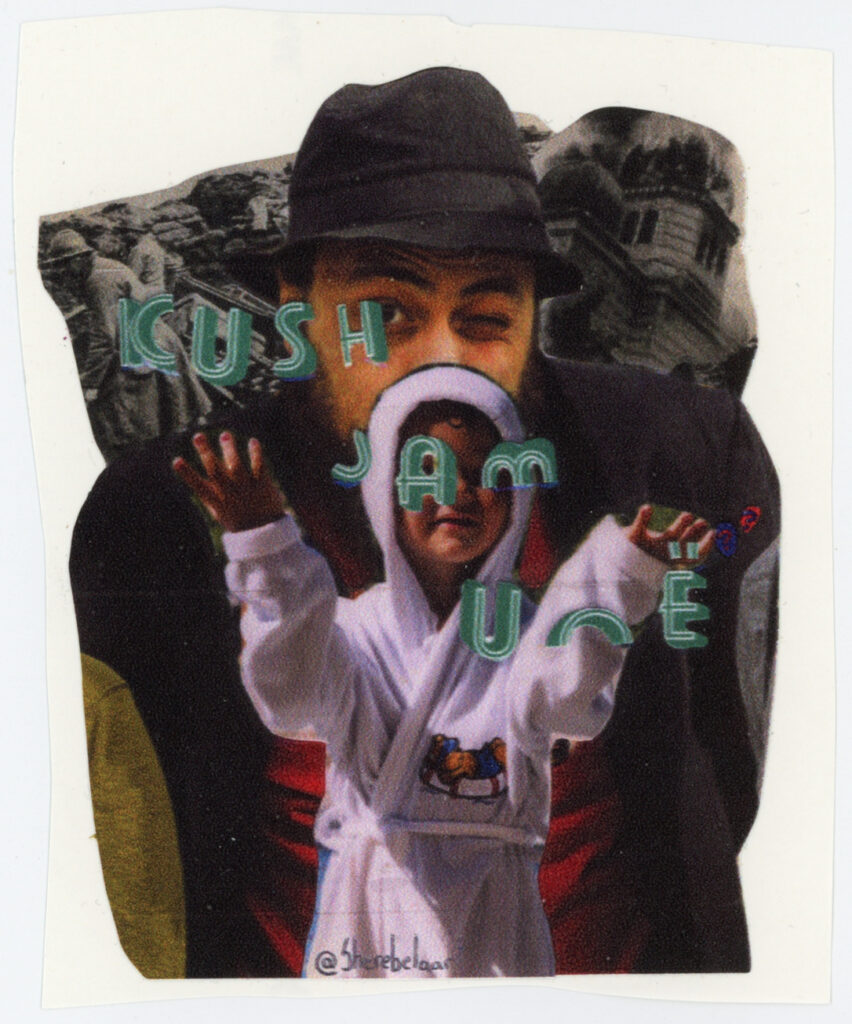
Fourth sticker | Sticker-i i katërt
Sherebel: This is an older one, actually, from a year ago or more. That’s me in the picture as a kid with arms open. It says “Kush jam unë?” which means “Who am I?” I think it was also a personal reflection regarding my place in society, but also the identity crisis that we as people go through in our modern societies, with everything being all over the place and really finding our space in this big global community.
SK: Who’s the figure in the background?
Sherebel: In the background I got this from…what was the book? From a film…documentary, no, film festival that it is being held here in Tirana. I think it was part of a band but I am not so sure…yeah. And in the background are images of explosions from war if I am not mistaken representing the chaotic part.
Sherebel: Ky është një sticker i vjetër në fakt, nga një vit më parë, ose dhe më shumë. Në foton qëndrore jam unë kur kam qenë fëmijë. Me krahët e hapur. Dhe ajo thotë “Kush jam unë?”, që do të thotë “Who am I?”. Mendoj se ky ka qenë një reflektim personal për sa i përket vendit tim në shoqëri por gjithashtu dhe krizës së identitetit që ne si njerëz kalojmë si pjesë në shoqëritë tona moderne, me çdo gjë që është një gjullurdi e madhe dhe kërkimi i vendit tonë në shoqërine globale.
SK: Po figura në sfond?
Sherebel: Sfondin e mora nga… si quhej ai libri? Nga një film, dokumentar… jo, festival filmi që mbahet në Tiranë dhe ky ishte pjesëtar I një bande por nuk jam shumë e sigurtë kush, po. Dhe në sfond janë dhe disa shpërthime, disa foto nga lufta të cilat përfaqësojnë pjesën kaotike.
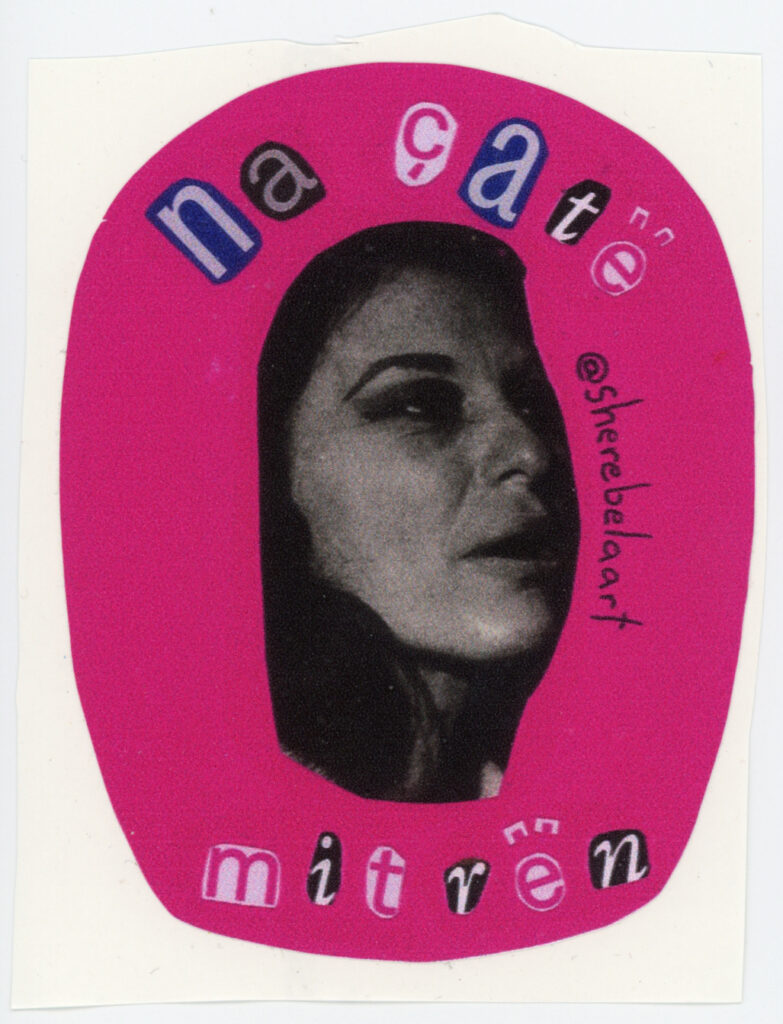
Fifth sticker | Sticker-i i pestë
Sherebel: There is more explanation to this one. It’s actually gotten pretty popular among people and people I know here in Tirana. It says “Na çatë mitrën” which is a bit difficult to explain. It has to do with insults or swear words that we use. Literally explained it means “You tore my uterus” but in Albania, for example, when people are angry or frustrated they can say “You tore my dick” which is like “Oh, you are bothering me, you are being so annoying.” It was a reflection on how even in swear words and insults, everything is centered around and oriented towards men. Everything has to do with being a male in society, and why does me having to show, wanting to show frustration or being angry, why do I have to translate it in a misogynistic or patriarchal language? So, this was the difference but also the freedom to also use swear words as girls or women to defy the idea that because we are girls and women, we have to be polite and not use these kind of words. It is a bit frowned upon if girls use those kinds of words.
SK: Yeah…and you said this one was very popular? People liked it?
Sherebel: It’s gotten quite popular because it is also showing some rebellion. This is what I was expressing at the time I did it, that I don’t care, and if I want to swear no one is going to stop me. No standards are going to stop me because I am just a human being. I am going to do it. It also has some women power in it, because bringing the word “uterus” is something that might be considered taboo. Bringing up female organs and genitalia and something that is not so accepted so to make it as normalize as saying “penis” or “dick” in society, why not do the same thing with our words and our bodies in that way?
Sherebel: Ka më shumë shpjegim për këtë. E në fakt është bërë goxha e njohur mes njerëzve që njoh në Tiranë. “Na çatë mitrën”, është pak e vështirë ta shpjegoj pasi ka të bëjë me të sharat që ne përdorim por nëse e përkthej fjalë për fjalë, do të thotë “You tore my uterus”. Njerëzit në shqip kur janë të frustruar thonë “Më çave ka*in” që do të thotë se po më bezdis apo po më acaron. Ky ishte një reflektim rreth faktit që dhe të sharat janë të qendërzuara rreth burrave dhe organit gjenital mashkullar. Si vajzë, përse më duhet ta organin gjenital mashkullor kur dua të tregoj se jam e inatosur apo e frustruar? Përse duhet ta përkthej në një gjuhë misogjene?
Pra ky ishte ndryshimi. Por është dhe elementi i lirisë së përdorimi të të sharave duke kundërshtuar idenë se ne duhet të jemi të sjellshme e most ë përdorim kështu fjalësh sepse jemi vajza.
SK: Po… dhe më the se është bërë goxha e njohur? E kanë pëlqyer njerëzit?
Sherebel: Është bërë goxha e njohur sepse tregon dhe rebelizëm. Dhe këtë gjë po shprehja në kohën kur e krijova, që nuk më intereson dhe se nëse dua të shaj askush dhe asnjë standard nuk mund të më ndalojë sepse unë jam një qenie njerëzore. Dhe patjetër elementi fuqizues në përdorimin e fjalës “mitër”, çka është diçka që mund të konsiderohet tabu, përmendja e organeve femërore është diçka që nuk është e pranuar, kështu qëllimi është që të normalizohet aq sa ç’është normalizuar të thuash “ka*”.
Sticker culture in Albania | Kultura e sticker-ve në Shqipëri
SK: Can you also tell me a little bit about sticker culture in Albania? Where would you see stickers? And are they in cities and small towns? Or is it more urban?
Sherebel: It’s pretty non-existent, I would say. It’s not really popular. We have mostly stickers that are done for specific functions or for different NGOs or different events, but it’s not a medium of self-expression.
SK: Have you ever been to Berlin, Germany?
Sherebel: In Berlin, no, in Germany, a bunch of cities, but not Berlin.
SK: Berlin has an amazing sticker scene. Certain neighborhoods, the walls…not the walls…but the signs and everything are covered…covered. I was just curious because I haven’t been to that many other cities in Europe but I was curious if it was like that. And what is name of the city you live in?
Sherebel: It’s the capital city, it is called Tirana.
SK: Okay cool. Well, this is great. And if you don’t mind I’ll loved to feature this in my blog. I’ll transcribe this interview and show it to you beforehand, and then I’ll publish it.
Sherebel: Of course, my pleasure.
SK: Mund të më tregosh pak mbi kulturën e sticker-ave në Shqipëri? Ku mund t’i shohësh sticker-at e tu? A janë më shumë në zonat urbane?
Sherebel: Do të thoja se është jo-ekzistente. Nuk është shumë e njohur. Sticker-at kryesisht bëhen për funksione specifike, për evente apo nga institucione, organizata, biznese… por nuk para përdoret si një kanal për shprehjen e vetes.
SK: Ke qenë ndonjëherë në Berlin, në Gjermani?
Sherebel: Kam qenë në disa qytete në Gjermani por në Berlin jo.
SK: Berlini ka një kulturë të paparë sticker-ash. Në disa lagje, muret… jo vetëm muret por dhe tabelat janë të mbushura me stickera. Dhe po vrisja mendjen pasi nuk kam vizituar shumë vende të tjera në Europë. Si quhet emri i qytetit ku ti jeton?
Sherebel: Është kryeqyteti i Shqipërisë, quhet Tirana.
SK: Në rregull. Kjo ishte shumë mirë. E nëse nuk e ke problem do të doja shumë që këtë bisedë ta shfaqja në blog-un tim. Do e transkriptoj këtë intervistë e do të ta tregoj përpara se ta publikoj.
Sherebel: Patjetër, është kënaqësia ime.
